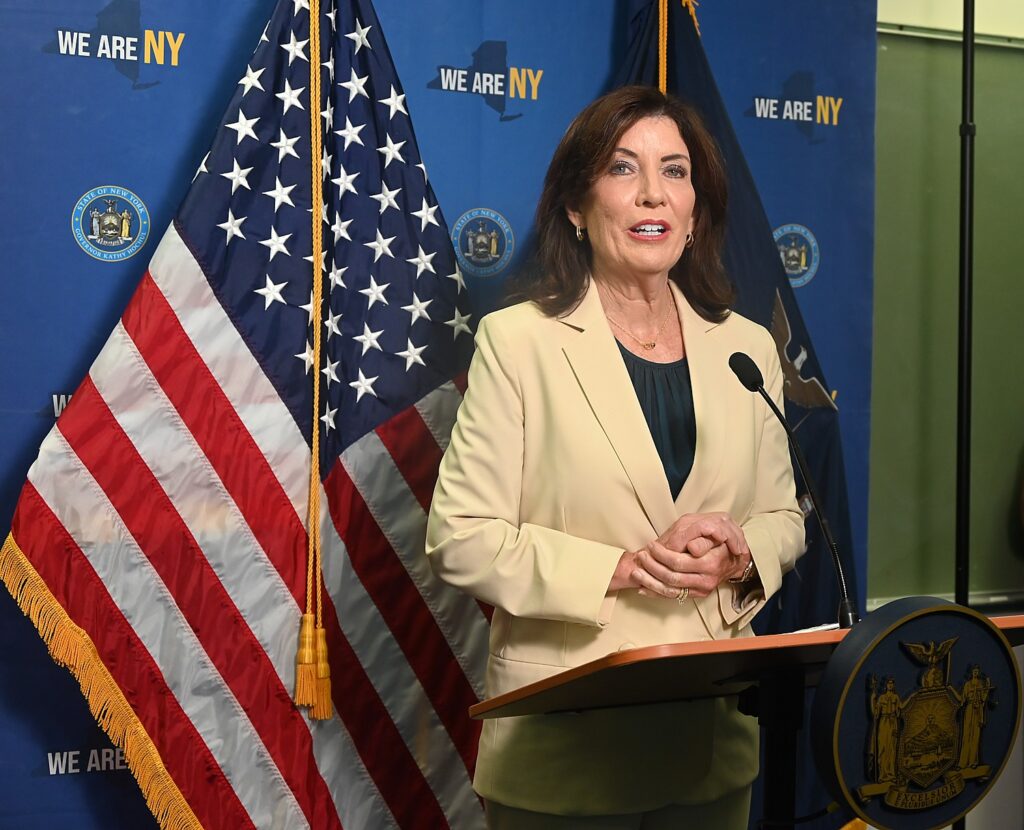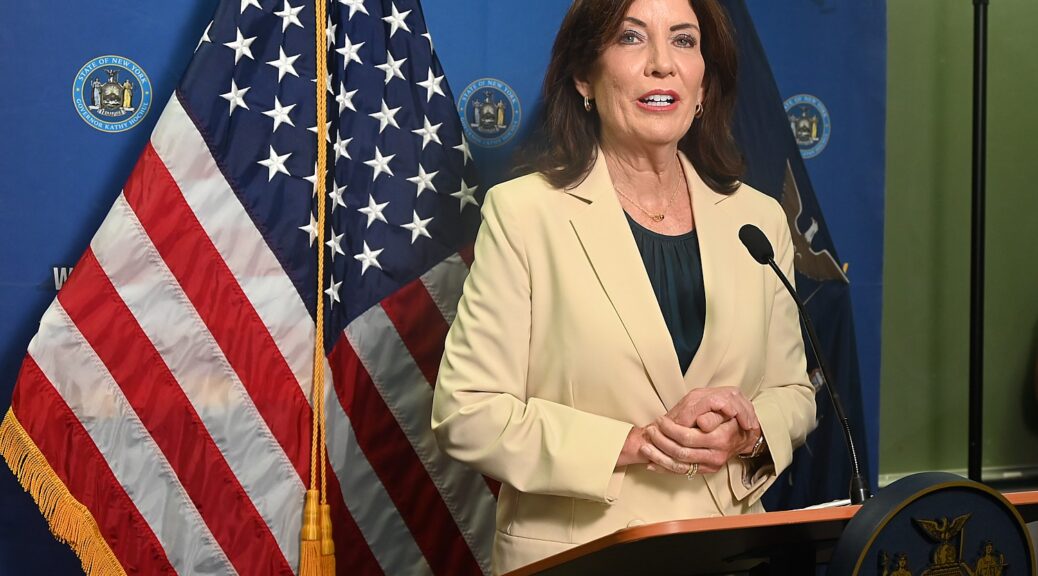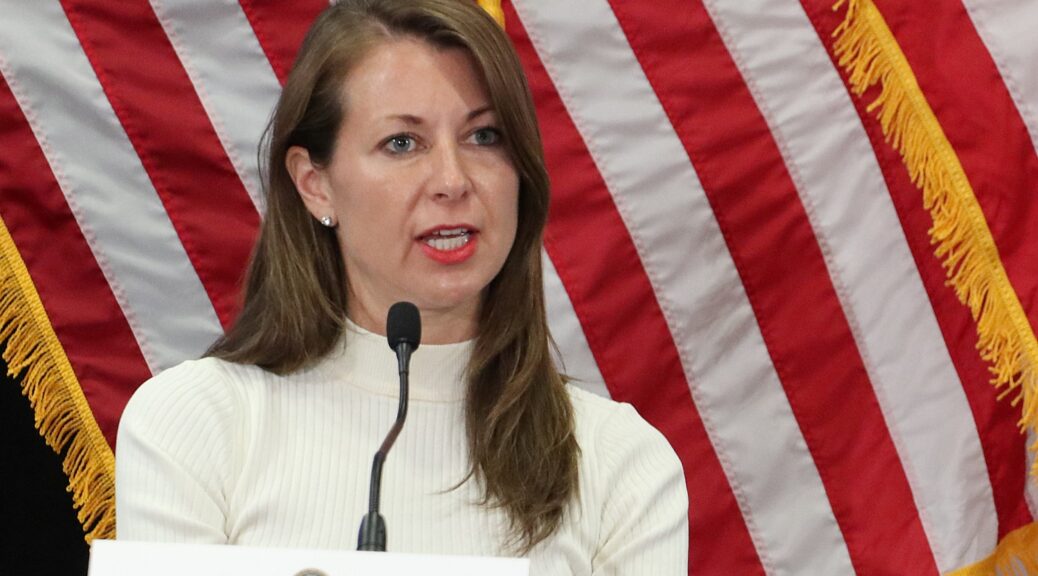
Governor’s Fiscal Year ’26 Executive Budget Includes Funding To Expand Access to Programs for Survivors and Improve Law Enforcement Response
Current Discovery Law Results in Delays and Automatic Dismissals That Adversely Affect Survivors of Domestic Violence
Following Enactment of Discovery Reform, There as Been a 94.3 Percent Increase in Dismissal of Cases Involving Domestic Violence in New York City and 49.1 Percent in Rest of State
Governor Kathy Hochul today convened a roundtable of survivors of domestic violence, advocates and local district attorneys to discuss New York State’s commitment and investments in combating domestic violence and supporting survivors. Governor Hochul proposed record-level funding in her Fiscal Year 2026 Executive Budget that will expand access to domestic violence prevention and sexual assault prevention programs, improve the medical and law enforcement response to intimate partner abuse and sexual violence, and better support survivors of domestic violence. To further support survivors — and deliver the justice they rightfully deserve — the Governor is pushing for essential changes to the state’s discovery process that will ensure their abusers are held accountable to the fullest extent of the law.
“Combating domestic violence is personal to me — and for the entirety of my career in public service, I’ve prioritized policies that protect survivors and improve law enforcement response to these crimes,” Governor Hochul said. “While crime is going down across New York, crimes related to domestic violence remain stagnant. To address this issue and ensure the safety of all New Yorkers, we need to continue funding the programs that protect victims and survivors, and streamline discovery laws to hold individuals who cause harm accountable for their actions.”
Office for the Prevention of Domestic Violence Executive Director Kelli Nicholas Owens said, “Not all victims and survivors choose to seek a law enforcement or criminal response to the abuse or violence they have endured, and that is okay. If they do decide to seek a criminal justice route to hold their offender accountable, they deserve to be met with a system that understands their individual needs and works in a way that is truly survivor-centered, trauma-informed and culturally responsive. A system that does not put the needs of the survivor first is a system that may cause further trauma and harm to the survivor and their family. Thank you, Governor Hochul, for your investments in victim and survivor well-being, and for inviting survivors to be a part of this important conversation.”
Proposed Changes to the State’s Discovery Law
The state’s current discovery statute details specific timelines for pretrial disclosure of information and evidence by prosecutors to the defense. Discovery reforms enacted January 1, 2020 made essential changes that allowed individuals accused of crimes to receive information and evidence earlier in the pretrial process to ensure a better understanding of the charges. The reforms, however, had unintended consequences resulting in procedural delays and dismissals that adversely affected victims and survivors of domestic violence and other crimes.
Since reforms were enacted in 2020, dismissed cases involving domestic violence rose nearly 15 percent in New York City. In 2023, 94.3 percent of cases were dismissed in New York City, and 49.1 percent were dismissed outside of New York City.
As a result, Governor Hochul proposed essential changes to New York State’s Discovery Law in the Budget. The tweaks would ensure procedural fairness, shorten case processing times, reduce the length of pretrial incarceration, and safeguard sensitive and personal information belonging to witnesses. These changes include:
- Expanding the scope of automatic redaction to include sensitive details, such as witnesses’ physical addresses and personal data unrelated to the case, eliminating the need to engage in lengthy litigation to redact such material.
- Removing the incentive to delay bringing a challenge in a manner that can result in technical dismissals unrelated to the merits of the case or the legality of the investigation.
- Ensuring that cases are not dismissed if discovery compliance falls short of perfection.
- Clarifying that prosecutors are not required to track down information that is by definition irrelevant.
The proposals align with Governor Hochul’s sustained investments in programs and initiatives that have allowed law enforcement agencies and community-based organizations address the causes and consequences of crime, and drive gun violence to record lows.
“I want to thank Governor Hochul, advocates, service providers and district attorneys for their steadfast commitment to protecting victims of crime,” Office of Victim Services Director Bea Hanson said. “These adjustments to discovery laws will ensure that any penalties are proportional to the violation, improving fairness in the justice system for domestic violence survivors and all who are victims of crime, while maintaining the rights of the accused. We at OVS are proud to work with OPDV and our sister agencies to improve public safety for all New Yorkers.”
Division of Criminal Justice Services Commissioner Rossana Rosado said,“At DCJS, we are proud of our work to advance the fairness and efficiency of the criminal justice system and our efforts to help keep New Yorkers safe. Using unprecedented investments secured by Governor Hochul, our law enforcement and community partners have made significant progress in the fight against violent crime. At the same time, it is critical that we continue our efforts to target, prevent and reduce intimate partner and domestic violence. I am grateful for Governor Hochul’s unparalleled leadership to improve safety for victims and survivors as shown by her record-setting investments, initiatives, and reforms proposed in the Executive Budget.”
“Again, we’ll always make sure that defendants get all the rights they’re entitled to under our system,” Governor Hochul stated. “It’s a founding premise of our democracy and our constitution. We believe in that. But why not have people stand up for the victims as well? That’s all we’re trying to do here. And the choice between fair and speedy trials, which are important objectives, but also letting dangerous abusers off the hook is a false choice. That is what is being portrayed here. We can and must do both. And I will simply harken back to the 2019 reforms. We did not make those historic changes in order to let abusers walk free. But that, my friends, is exactly what is happening.
“So, we have legislation that specifically when it comes to victims of domestic violence, expanding the scope of automatic redaction, changing the timing requirements, but also misunderstanding, these are human beings. These are people whose cries for help have led them out of their home into a public space subjected to ridicule and abuse from the abuser, even in a courtroom. But when they’re willing to do that and we turn our backs on them, we must look at ourselves and say, “Is this a society we want to have to continue here in the State of New York?” I say, no. And that’s why I’m fighting hard, fighting very hard to make these necessary changes.”
Resources for Public Safety in the Budget
In addition to reductions in gun violence, the number of homicides decreased 15 percent statewide from 2022 to 2023 — 791 down to 670 — which is shown through the latest data available. Domestic homicides, however, increased by 7 percent (126 vs. 135), and the 135 homicides in 2023 represented 20 percent of all homicides. In 2020 and 2021, domestic homicides represented 14 percent of total homicides reported statewide. Police departments and sheriffs’ offices outside of New York City collectively reported a 7 percent increase in the number of victims of intimate partner violence in 2023 compared to 2022 — from 33,684 to 35,947. New York City also saw a 7 percent increase in the number of victims of intimate partner violence — 29,372 compared to 27,527 — during the same time.
Governor Hochul’s proposed Budget also includes record-level funding to improve services and increase access to programs that support victims and survivors, including:
- $379.5 million over three years to support crime victim services statewide: Victim assistance programs provide counseling, support groups, criminal justice advocacy, civil legal services, and assistance with filing for crime victim compensation, among other help. That amount includes $100 million in state funding annually for the next three years, allocated by Governor Hochul to offset any reductions in federal funds.
- Nearly $41 million to improve the public safety response to intimate partner abuse and domestic violence, and better address the needs of victims and survivors: $5 million divided among the five New York City District Attorneys’ Offices; $23 million for law enforcement and services providers in 20 counties outside of the five boroughs; up to $7 million for the State to provide training and technical assistance, risk assessment tools, and investigative support to participating agencies and improve the domestic violence reduction efforts of state agencies; and an additional $5 million in the Budget to help police agencies and prosecutor’s offices adopt evidence-based enforcement, investigation, and prosecution strategies.
- $12.8 million — double the current funding — for the New York State Department of Health’s certified rape crisis programs that ensure advocates are available by phone or in-person to provide information, emotional support and other services: The Budget also would require all hospitals to provide access to medical professionals specifically trained to perform forensic sexual assault exams; increase reimbursements to medical providers for those exams; and provide a full course of preventive treatment for HIV exposure to all survivors of sexual assault, not just those younger than 18.
Trump’s “Justice” Department Looks to Restore Gun Rights to Abusers
In contrast to the actions New York State is taking to protect victims of domestic violence, Trump’s Department of Justice is working feverishly to restore gun rights domestic abusers.
An AI review of Everytown for Gun Safety, the National Domestic Violence hotline and others reports:
In the U.S., firearms are used in a significant portion of intimate partner homicides, with women being the victims in over three in four such cases. More than 750 women are killed by intimate partners with a firearm each year, and guns are used in more than three in five of all intimate partner homicides.
Here’s a more detailed breakdown:
- Frequency of Intimate Partner Homicides with Firearms:
- Every 12 hours, someone is shot and killed by an intimate partner.
- · More than 750 women are killed in firearm-related intimate partner homicides each year.
- · On average, 76 women are shot and killed by an intimate partner every month.
- · More than seven in 10 intimate partner homicides in the United States are committed with a gun.
- · Firearms are used in over 50% of intimate partner homicides.
Impact on Women:
- Women are the victims in more than three in four intimate partner homicides with a gun.
- · Nearly 6 million women reported having a gun used on them by an intimate partner, according to the National Domestic Violence Hotline.
- · Women are 28 times more likely to be killed with a gun than women in other high-income countries.
Other Relevant Statistics:
- Over 48,000 people died by firearms in the United States in 2022.
- · In 2022, 19,651 people died by firearm homicide.
- · The presence of a firearm in a domestic violence situation increases the likelihood of homicide by 500%.
- · In 2021, there was a 28% increase in intimate partner homicides involving firearms from 2019, according to Brady United.



